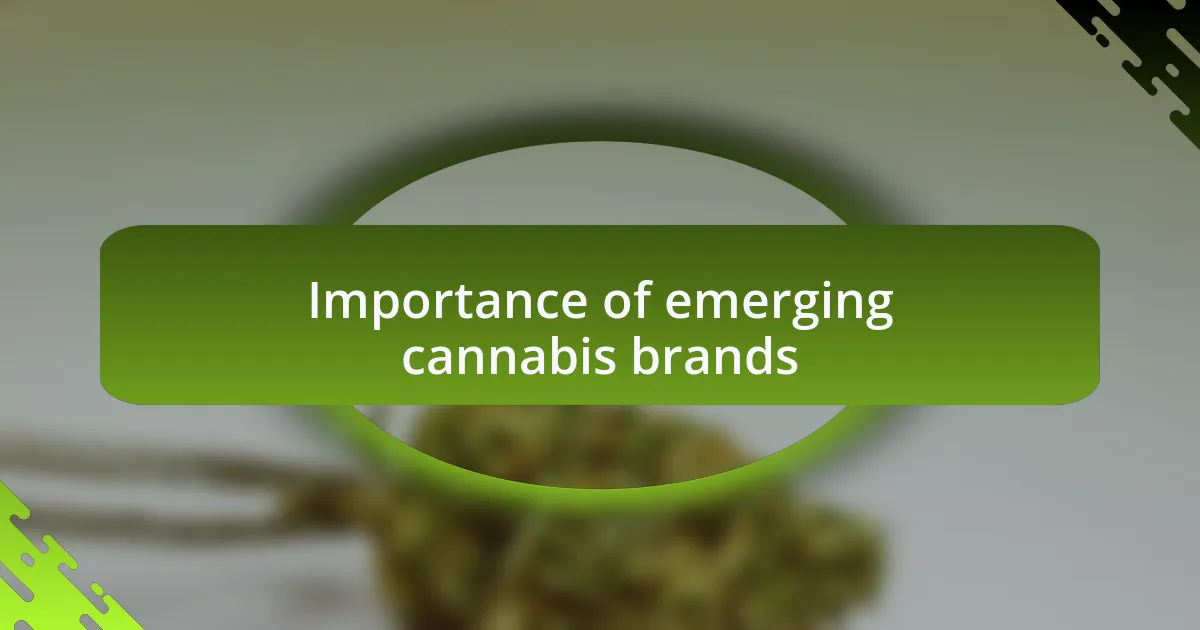Key takeaways:
- The cannabis retail industry has evolved rapidly, necessitating an understanding of regional regulations and the importance of branding for consumer engagement.
- Emerging cannabis brands are innovating and promoting sustainability, fostering competition and diversity in consumer experiences.
- Trends like brand storytelling, personalization, and strong digital presence are shaping consumer connections and loyalty in the cannabis market.
- Successful cannabis brands prioritize product quality, community engagement, and transparency to build trust and consumer confidence.

Understanding cannabis retail industry
The cannabis retail industry has experienced remarkable growth, evolving from a niche market to a mainstream business within a few years. I remember my first visit to a dispensary; it was a vibrant space filled with curious customers and knowledgeable staff. This lively interaction felt almost like stepping into a new cultural hub, showcasing how cannabis has been integrated into daily life, and it spoke volumes about consumer acceptance.
Understanding the cannabis retail landscape requires acknowledging the unique regulations that vary by region. Have you ever wondered how such a diverse range of products—from edibles to oils—can exist legally? It takes a close relationship with regulation agencies and constant adaptation. Each state has its framework, which shapes how businesses operate, from licensing to product quality standards.
Additionally, branding is pivotal in this competitive industry. I often find myself drawn to brands that tell a compelling story or share a mission that resonates with my values. It’s fascinating to see how emerging cannabis brands are competing, not just on product quality, but also on their ability to connect emotionally with consumers. This aspect of branding makes me reflect on how important it is for businesses to engage directly with their audience to foster loyalty in such a dynamic market.

Importance of emerging cannabis brands
Emerging cannabis brands play a crucial role in shaping the industry landscape. I can’t help but think about the innovative ideas these newcomers bring to the table, breaking away from the traditional molds of branding and product offerings. When I see brands that prioritize sustainability and social responsibility, it inspires me to support their missions.
These brands often generate fresh perspectives, helping to drive trends that resonate with a more diverse consumer base. I remember discovering a small cannabis brand that focused on holistic wellness, and it completely changed how I view cannabis in relation to self-care. Their approach showcased that cannabis is not just about recreational use; it can also be about nurturing both body and mind.
Additionally, the presence of these emerging brands promotes healthy competition in the market, encouraging established players to innovate as well. Have you noticed how often price points, quality, and even packaging are influenced by new entrants? This dynamic keeps the entire industry on its toes, ultimately benefiting consumers who are looking for the best experiences and products.

Trends in cannabis brand development
The trend of brand storytelling has become increasingly significant in cannabis brand development. I find it fascinating how new brands leverage narratives to connect with consumers on a deeper level. For instance, a brand I came across not only shared its origin story but also highlighted the personal journeys of its founders, making me feel more invested in their mission.
Customization and personalization stand out as another critical trend. Brands are recognizing that consumers crave unique experiences tailored to their preferences. I recall my excitement when I found a local dispensary that offered personalized recommendations based on my specific wellness goals. This level of engagement transforms the shopping experience from a simple transaction into a meaningful interaction.
Lastly, the rise of digital presence cannot be overlooked. Emerging brands are adept at using social media and e-commerce to build their identities. I’ve seen brands engage with community feedback online, shaping their products based on customer input, which makes me feel more connected and valued as a consumer. How often do you see brands that actively listen and respond? It’s this kind of authenticity that resonates with today’s conscious consumers.

Characteristics of successful cannabis brands
Successful cannabis brands exhibit a genuine commitment to quality, cultivating trust with consumers. From my experience, when I find a product that consistently delivers in potency and taste, it fosters loyalty. It’s as if the brand is saying, “We care about what you consume,” and that assurance is hard to find elsewhere.
Another defining trait is community engagement. I recently came across a brand that not only supports local events but also partners with local artists for limited edition packaging. This tactile connection to the community makes me feel like my purchase is not just recreational; it’s also a contribution to local culture. Can you think of a brand that fosters such connections?
Transparency is equally crucial in establishing a brand’s credibility. For instance, when a brand openly shares its cultivation practices and lab testing results, I feel more confident in choosing their products. Imagine browsing through options and seeing clear explanations of their sourcing; it feels like an invitation to trust. By being open about their operations, brands not only inform but also empower their consumers to make knowledgeable choices.

How to evaluate cannabis brands
When evaluating cannabis brands, I always start with their product quality. It’s one thing for a brand to market itself with flashy packaging, but if the product doesn’t deliver, I feel disappointed, almost betrayed. I remember trying a new brand that promised high potency; unfortunately, it fell short, and I remember thinking, “What happened to the hype?” That experience taught me to trust my own research over flashy ads.
Another factor I consider is the brand’s reputation within the community. I’ve often turned to online reviews and social media to gauge how others perceive a brand, especially when it comes to their customer service. There was a brand I was curious about that had numerous glowing reviews for their customer support, which made me feel confident enough to try their products. It really resonated with me that people were not just satisfied with the product but felt valued by the brand itself.
Lastly, I’ve learned to look into sustainability practices. In a market flooded with choices, I find it more rewarding to support brands that prioritize eco-friendly cultivation and packaging. I once switched to a brand that not only used biodegradable materials but also shared their sustainable farming stories. I remember feeling a sense of pride whenever I purchased their products, knowing I was contributing to a healthier planet. Have you ever felt that special connection to a brand simply because of its values? It makes all the difference in your purchasing decisions.